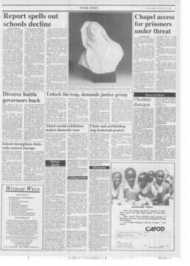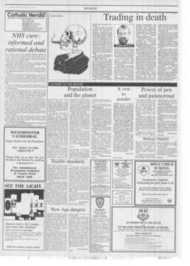Page 6, 11th October 1991
Page 6

Report an error
Noticed an error on this page?If you've noticed an error in this article please click here to report it.
Tags
Share
Related articles
Lucky Martin
Confronting Death In An Age Of `horrorisrn'
Books In Brief
Surviving A Romp In Manhattan
How India's Hidden Catholics Became The Backbone Of The Raj
Looking ahead to where we've been
Time's Arrow by Martin Amis (Jonathan Cape, .£13.99) Wynn Wheldon
LIKE a good nco-Elizabethan Martin Amis is a master of conceit, and his new novel abounds in them.
Firstly, the book is written backwards (presumably an elaborate system of mirrors was required in the printing of it) so that smoke goes downwards, and breakfast is taken from the mouth and placed upon the plate. I will not dwell (as Amis likes to like father, like son) on human
digestive processes. Time's i arrow is n fact pointing the wrong way. When people move they look where they've come from, not where they're going".
To sustain this is very clever, but also very irritating. It might have been otherwise for there is great scope for comedy in the idea. Unfortunately the subject Amis has chosen is not a comical line. The second conceit is that our narrator inhabits the body, but not the mind, of a Nazi doctor who worked at Auschwitz, escaped and went to live and work in the USA. Time's arrow, pointing the wrong way, means of course that the Nazi doctor helps create rather than destroy the Jews. In which case the passages in the first part of the book in which he is taking life away, and inflicting horrible wounds on his American patients ought to be really quite repulsive and they are not.
The body which the narrator inhabits changes its name as the book regresses. Tod ('death' in German) Friendly becomes John Young (get it?) becomes Hamilton de Souza (someone will get it) becomes Odilo
Unverborden ("unsullied"). This
seems to me tantamount to an admission by the author that he is not concerned to reflect on human nature. Which is fine so long as you don't take on a subject of such human magnitude. Our understanding of the holocaust is increased not one jot. So either Mr Amis is very brave or else he has made a gross error of moral judgement.
It might be argued that showing us that holocaust backwards he demonstrates how the Nazis took upon themselves the prerogative of God in creating man; or he might be suggesting that their atrocities were not inhuman but profoundly human.
But there is too much pleasure in this book to sustain such arguments. Why write it in American, for example? All Amis's devices and conceits
suggest a desire for disengagement. The subject is too big for him, too messy. And Amis wants to write a perfect book. Walter Pater, guru of art for art's sake, would have approved. It is this incongruity between form and content which makes Time's Arrow so unconvincing as a novel, and so morally negligent as a piece of
literature.
Martin Amis is a very good writer, but he is not much of an author. While reflecting his generation's facetiousness in earlier novels has failed to enter into the the world behind it, or to suggest the reasons for it. What once seemed clever now appears odious. The novelist has complained that at forty-two he is too old be be an "enfant terrible", but it is surely up to him to act his age. It is time to stop excusing him, and start demanding the novel which most of us believe he can write.
blog comments powered by Disqus











